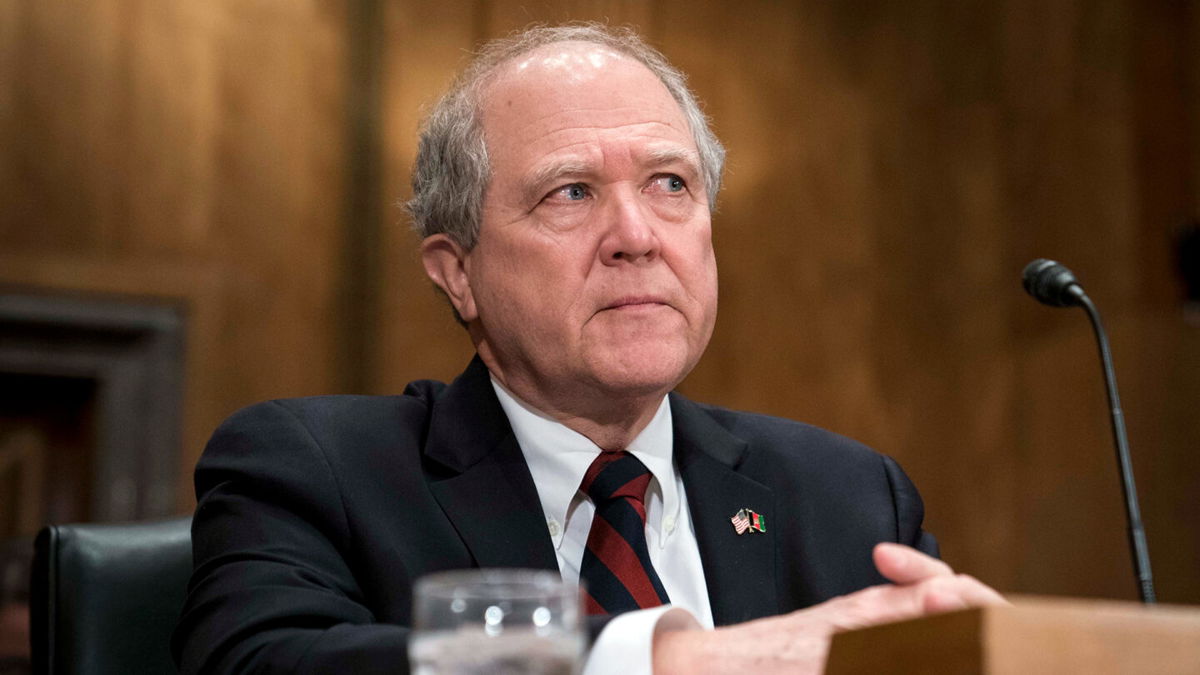US Afghanistan watchdog tells Congress he can’t guarantee American aid is ‘not currently funding the Taliban’

John Sopko
By Haley Britzky, Oren Liebermann and Jeremy Diamond, CNN
The US government’s Afghanistan watchdog told lawmakers Wednesday that he cannot say with certainty that US aid to the country is “not currently funding the Taliban.”
“While I agree, and we all agree Afghanistan faces a dire humanitarian and economic situation, it is critical that our assistance not be diverted by the Taliban,” John Sopko, the Special Inspector General for Afghanistan Reconstruction (SIGAR), told the House Oversight Committee. “Unfortunately, as I sit here today, I cannot assure this committee or the American taxpayer we are not currently funding the Taliban.
“Nor can I assure you that the Taliban are not diverting the money we are sending from the intended recipients, which are the poor Afghan people,” he said.
“I would just say, I haven’t seen a starving Taliban fighter on TV, they all seem to be fat, dumb, and happy,” Sopko later added. “I see a lot of starving Afghan children on TV, so I’m wondering where all this funding is going.”
Sopko’s testimony before Congress — alongside other government inspectors general — coincided with the release of the latest SIGAR report, which said that efforts to process Afghan visa applications or refugee applications are chronically understaffed and face a backlog of approximately 175,000 applicants.
“According to one estimate, at the current pace, it will take 31 years to relocate and resettle all SIV applicants,” SIGAR wrote in the report, called the 2023 High-Risk List.
Initially tasked with overseeing US spending in Afghanistan when the US had a large presence in the country, SIGAR is now focused on monitoring more than $8 billion dedicated to Afghanistan since the US withdrawal.
Instead of dealing directly with the Taliban, with which the US has no formal ties, the Biden administration has tried to direct the money into Afghanistan through international organizations and NGOs. But without US observers on the ground to monitor the use of the funding, SIGAR warns in its latest report that aid to the Afghan people could be diverted before it reaches its intended recipient.
The lack of effective oversight increases the risk that the US funds will end up in the wrong hands, “subjected to waste, fraud, and abuse,” SIGAR wrote.
USAID spokesperson Jessica Jennings said Wednesday that the agency “continually assess our activities to ensure both that our assistance is reaching those for which it is intended and that our partners have effective mitigation measures in place to help safeguard against diversion.”
Wednesday’s hearing comes roughly two weeks after the Pentagon and State Department sent classified findings of their after-action reviews of the Afghanistan withdrawal to Congress, and the White House released a summary of those findings.
The summary released by the White House largely blamed the Trump administration for setting conditions that led to the disastrous 2021 withdrawal, avoiding a full-throated admission of mistakes on the Biden administration’s behalf. The summary did, however, acknowledge some lessons learned from the withdrawal.
One source familiar with the State Department’s report previously told CNN that it “is a bit disingenuous” for the Biden administration “to say that their hands were completely tied.”
“The Biden administration inherited a deadline without a clear plan of how to get there, but they then undertook their own review. And in April, Biden decided to go ahead with it and delayed the withdrawal timeline,” the source said. “So they did not exactly take the blueprint they were given in that regard.”
Republicans have vowed for months to scrutinize the withdrawal in congressional hearings, and in March followed through with a House Foreign Affairs Committee hearing in which lawmakers heard from two service members on the ground during the withdrawal and individuals involved in evacuation efforts.
Comer said on CNN that Wednesday’s hearing is about having “better checks and balances and oversight” of humanitarian aid going to Afghanistan.
“There’s no victims of the Afghanistan withdrawal that will be testifying, this is all inspector generals, the people that are supposed to be in charge of auditing to make sure our tax dollars are going where they say they’re going,” he said.
Visa Delays
SIGAR’s report released Wednesday says that in addition to an extended waiting period for the processing of a visa application, the US never maintained a comprehensive database of Afghans eligible for US visas, creating “almost insurmountable burdens” on Afghans to recreate evidence of their work with US forces.
“Twenty months after the withdrawal, many are in hiding in Afghanistan, trying to escape Taliban retaliation,” SIGAR said of Afghans still in the country. “Others have already been arrested or killed.”
On Wednesday morning, the White House sought to pre-but Republican criticism of Biden’s handling of the withdrawal sure to come on Wednesday, accusing House Republicans of carrying out “politically-motivated attacks” while failing to agree on measures that would grant Afghan allies a pathway to permanent legal status in the US.
In a memo distributed to Democratic lawmakers and other allies ahead of Wednesday’s hearing, the White House’s oversight spokesman Ian Sams accused House Republicans of “hypocritically” attacking Biden over the withdrawal while failing to act on the Afghan Adjustment Act, which would give tens of thousands of Afghans living in the US on temporary status a pathway to permanent residency.
“Let’s be very clear: with their politically-motivated attacks, these MAGA House Republicans are hoping to distract from their own failure to even agree upon, much less act on, solutions that are desperately needed today to protect the progress the Biden Administration has made to safely evacuate tens of thousands of people from Afghanistan at the end of the war,” Sams wrote in the memo, which CNN obtained.
“If they really care about America’s ongoing commitments on Afghanistan, instead of staging political stunts aimed at attacking President Biden, House Republicans should do their job and take action on these important ongoing priorities.”
Sams also rejected Comer’s claim that the Biden administration has “obstructed” SIGAR’s investigations, arguing the administration has “provided thousands of pages of documents, analyses, spreadsheets, and written responses to questions.”
Still, Sopko repeatedly made the claim on Wednesday, saying the lack of cooperation from the State Department and USAID “is unprecedented in the nearly 12 years that I have been the SIGAR.”
Later in the hearing, Sopko said he has not received responses from the State Department or “anybody in the administration, really.”
Sopko also pushed back on some assertions made by the White House in its summary, particularly regarding the expectations for the Afghan government and comments made about the chaos of the withdrawal.
The summary, for example, said the Afghan forces were 300,000 people strong, which was “vastly superior” to the Taliban’s forces.
“I don’t know who is telling the administration there were 300,000 Afghan soldiers and police toward the end,” Sopko said. “Nobody we talked to ever said that that number was near there.”
Political back-and-forth
Assessments from lawmakers of who was to blame for the withdrawal and its subsequent impacts largely fell along party lines in the hearing.
In opening remarks, Comer said that Biden’s “poor leadership and planning” was to blame for the withdrawal, while Ranking Member Rep. Jamie Raskin, a Democrat, said it was “morally confused and politically cynical” to blame the Biden administration.
“The Afghan War was America’s longest war,” Raskin said. “It spanned four Republican and Democratic presidential administrations.”
The debate over who was to blame continued throughout the hearing, which lasted more than four hours.
Lawmakers repeatedly pointed across the aisle, using their allotted time for questions to reference decisions made by presidents of the other party over the last 20 years.
In one moment, Florida Democrat Rep. Jared Moskowitz recalled Afghanistan’s release of hundreds of Taliban prisoners as part of the US and Taliban agreement. Sopko said previously in the hearing that the deal to release those prisoners was struck in part by then-Secretary of State Mike Pompeo.
“Can you imagine for a second, you don’t have to answer this one, if Joe Biden had released 5,000 Taliban prisoners, many of whom probably wound up in Kabul that day?” Moskowitz asked.
In another moment of the hearing, Michigan Republican Rep. Lisa McClain said the “Biden administration has wholeheartedly defended this atrocity in Afghanistan.”
“In good conscience, would you call the death of 13 service members, the loss of billions of US assets which by the way are paid for by US taxpayers, the abandonment of US partners, and now the potential for another terrorist safe haven in Afghanistan — would we define that as a success?” McClain asked Sopko.
Amid the back-and-forth, however, Sopko made clear during Wednesday’s hearing that mistakes over two decades contributed to the state of Afghanistan today.
“I think we highlight that … four administrations made many mistakes over that 20 years,” he said.
The-CNN-Wire
™ & © 2023 Cable News Network, Inc., a Warner Bros. Discovery Company. All rights reserved.
CNN’s Allison Gordon contributed reporting.



